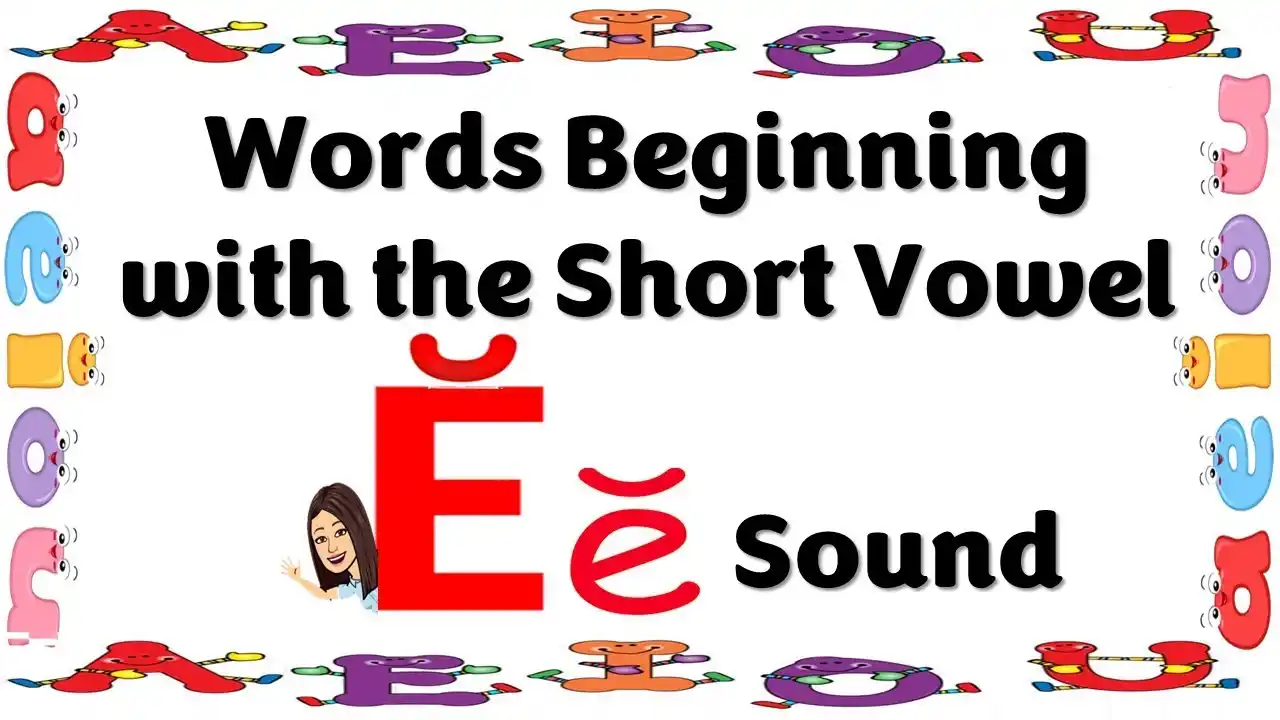The E sound words in English play a crucial role in pronunciation and vocabulary. Words with the long E sound include beach, tree, and repeat, while short E sound words include bed, pen, and red. Mastering these words improves reading and speaking skills. The letter E appears in various combinations, such as ea in “read,” ee in “sheep,” and ei in “receive.” Practicing words that start with the “E” sound in English helps with clear communication. Whether learning phonics or enhancing fluency, understanding the E sound is essential for effective language use.
Common words with the e sound
Some common words with the “e” sound include:
- Said
- Friend
- Red
The “e” sound can be found in many different words in the English language. It is a versatile sound that is often used in everyday speech. Whether it’s in words like “said” or “friend,” the “e” sound is a significant part of our language.
One of the most recognizable words with the “e” sound is “red.” This color is a primary color and is often used to symbolize passion, love, and anger. The sound of “e” in this word is short and crisp, adding to its intensity. Overall, words with the “e” sound can create a variety of different meanings and emotions in everyday language.
Practice exercises for the e-sound
- To practice the e sound, try saying words with this sound slowly and clearly. Some examples include words like “pen,” “met,” and “red.” Pay attention to how your mouth and tongue move to create the sound. Take your time and repeat the words several times to reinforce your pronunciation of the ‘e’ sound.
- Another exercise for the e sound is to pair it with other vowel sounds to form diphthongs. For example, try saying words like “set” or “let” where the e sound is combined with the short e sound. This will help you differentiate between similar sounds and improve your overall pronunciation skills.
- For a more challenging exercise, try to pronounce longer words with multiple e sounds, such as “elephant” or “recipe.” Focus on maintaining the correct sound throughout the word and pay attention to any variations in pronunciation. Practice regularly to become more comfortable with the e sound in different contexts and words.
E found words in daily conversation.
In daily conversation, we often use common words that we may not even realize are onomatopoeic. For example, the sound of a doorbell “ding-dong” or the sound of a phone ringing “ring ring” are both examples of onomatopoeia that we use frequently in our language. These words are not only descriptive but also help to convey the sound they represent in a simple and easy-to-understand way.
Other onomatopoeic words that we use in daily conversation may include “crash,” “pop,” or “buzz.” These words are not only descriptive of the sounds they represent but can also convey a sense of urgency or excitement in the conversation. By incorporating these onomatopoeic words into our daily speech, we can add an extra level of vividness and clarity to our communication.
Overall, onomatopoeic words play a significant role in our daily conversations, helping us to better convey the sounds and noises that we encounter in our everyday lives. Whether it’s the chirping of birds, the hissing of a snake, or the pitter-patter of rain, onomatopoeic words allow us to bring these sounds to life through language and enhance the richness of our communication.
Sound families with the e-sound
Many families with the e sound in their name include the Smiths, the Hendersons, and the Jenkins. People often see these families as strong and close-knit, deeply connected to their heritage and traditions. The Smiths, for example, show their hard work and dedication to their family members, while the Hendersons display their outgoing and friendly nature. The Jenkins, on the other hand, embrace creativity and artistry, passionately allowing their individuality to shine.
Families with the e sound in their name tend to have a strong sense of identity and pride in their heritage. This can be seen in the way they celebrate family traditions and pass down stories and values from generation to generation. The Smiths, Hendersons, and Jenkins are all examples of families who place importance on their shared history and work together to create a sense of unity and connection.
In conclusion, families with the e sound in their name often have a unique bond that is built on shared experiences, values, and traditions. Whether it be the Smiths, Hendersons, or Jenkins, these families demonstrate the power of unity and resilience in the face of challenges. Their strong sense of identity and pride in their heritage make them a shining example of the importance of family in our lives.
Engaging activities to reinforce the e-sound
- Engaging activities to reinforce the “e” sound in words can include word recognition games like word bingo, where players listen for words that contain the target sound and mark them off on their bingo cards. Another fun activity could be creating a scavenger hunt for words with the “e” sound in them around the room or outdoors. This active and hands-on approach not only reinforces the sound but also helps with word identification and spelling.
- Incorporating technology can also be a helpful tool for reinforcing the “e” sound. Educational apps and online games can provide interactive and engaging activities that focus on phonics and word recognition. For example, virtual flashcards or matching games that specifically target words with the “e” sound can be a great way to practice and reinforce this skill in a fun and interactive way.
- Reading books with a focus on “e” sound words can also be a valuable activity to reinforce this phonetic skill. Additionally, discussing the meanings of the words and using them in sentences can further reinforce their understanding and retention of the “e” sound.
Air Transport Name
Air transport plays a crucial role in modern connectivity, enabling swift movement across the globe. Some prominent air transport names include global giants like Emirates, Air India, Delta Airlines, and Singapore Airlines, which offer both domestic and international flights. These air carriers have built extensive networks, providing passengers with comfort, reliability, and speed. Additionally, companies like FedEx Express and UPS Airlines focus on cargo air transport, ensuring timely deliveries worldwide. Whether for leisure or business, air transport names represent the backbone of international travel, connecting people and economies around the world.






[…] E Sound Words In English […]